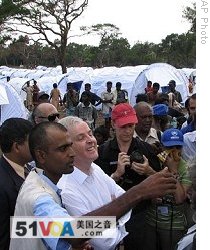Colombo
27 April 2009
The Sri Lankan government says although major combat operations against the remaining Tamil Tiger rebels have ended, a military sweep continues to bring about a total defeat of the quarter-century old insurgency. But the Liberation Tigers of Tamil Eelam, fighting for their own ethnic homeland, say despite being reduced to a small sliver of land on the island nation's northeast coast, surrender is not an option.
Facing intense diplomatic pressure to declare a cease-fire, Sri Lanka says its military is no longer using heavy weaponry and aerial bombing against the remaining few-hundred rebels still fighting.
There is intense international concern about civilians trapped in the war zone.
 |
| Top UN humanitarian official John Holmes, center white shirt, speaks to internally displaced ethnic Tamil civilians during a visit to a displacement camp in Sri Lanka, 27 Apr 2009 |
President Mahinda Rajapaksa informed the U.N.'s John Holmes that combat operations against the rebels are over - a day after the military rejected a unilateral ceasefire by the LTTE.
Holmes told reporters, shortly before departing the country, he hopes reports of ongoing shelling are not true, noting that previous such commitments by the military were not honored.
"We need to see what that does mean on the ground. I hope it means that the intensity of the fighting will be very much reduced. That would give an opportunity for the population to get out safely and indeed there will not be heavy weapons used."
A statement attributed to the LTTE said military air strikes continued after the announcement and the government was deceiving the international community.
The government, the United Nations, and the Tamil rebels all cite different numbers of how many civilians remain trapped - from as low as 10,000, as the government contends, up to 150,000, the rebels' claim.
 |
| UN official John Holmes |
"The key thing is; however many there are, these are people who are in mortal danger as long as the fighting goes on," said Holmes. "So we need to get them out of there as soon as possible and that is very much our objective."
The humanitarian chief, during his two-day visit, failed to win government approval for a U.N. team to enter the war zone. He says he was disappointed to be told it is not possible due to security conditions.